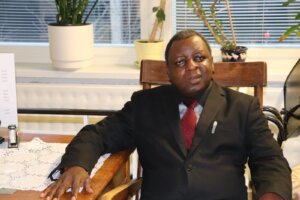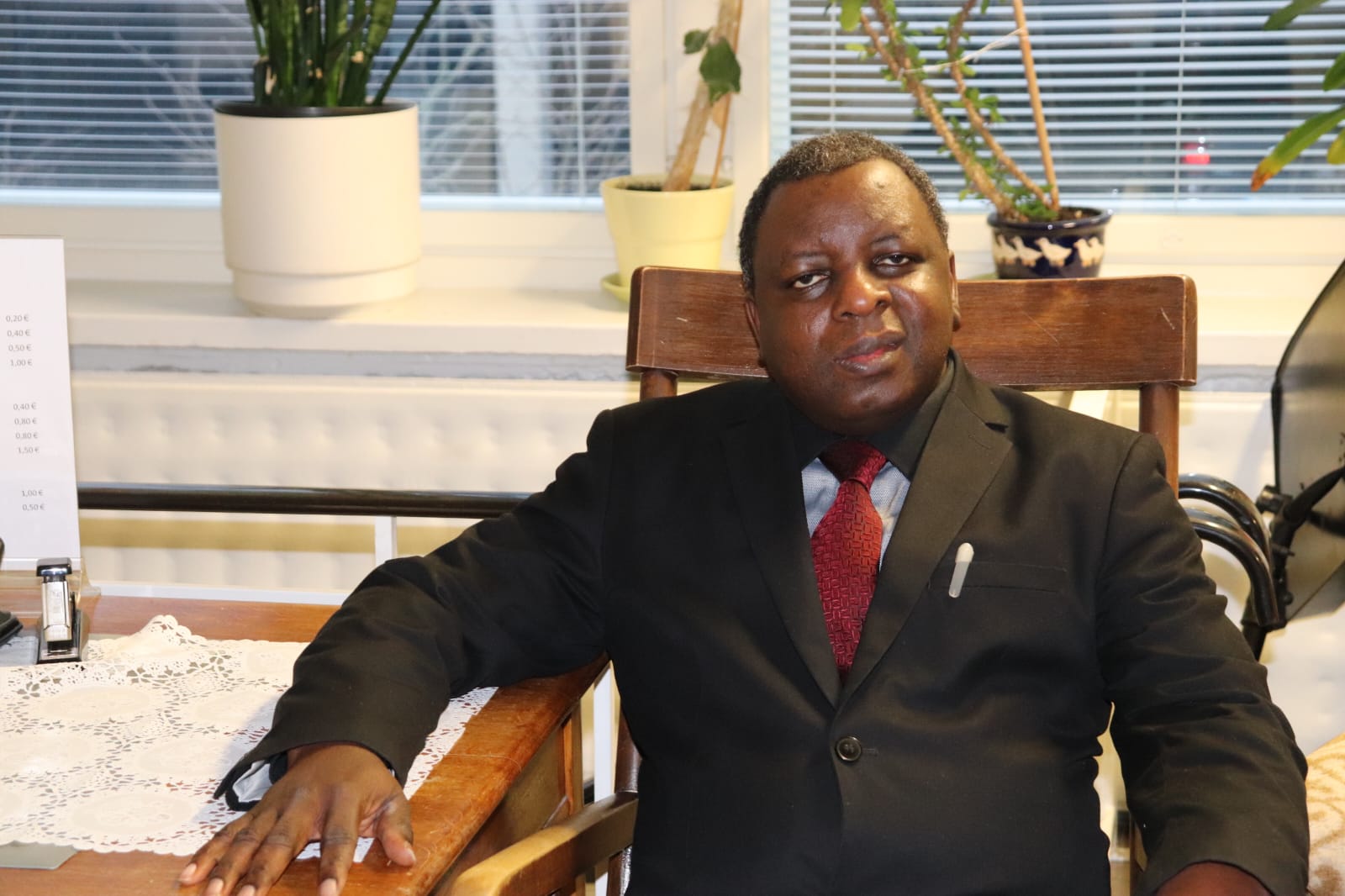The Researcher.Life Ambassador Program is a global community of researchers who wish to give back to their academic communities through mentoring and collaboration with other researchers. Researcher.Life Ambassadors empower themselves and their fellow researchers with advanced tools and services from Researcher.Life that help them do more, be more, and succeed more. Every month we spotlight one Ambassador who has gone the extra mile in supporting their academic community.
This time, the ambassador of the month at Researcher.Life is Sunday Adewale Olaleye. He is a multidisciplinary researcher from Nigeria doing research in Finland in the field of Data Economy.

Could you tell us a little about your research?
I studied Information Systems at Abo Akademi University, Turku, Finland and Marketing at the Oulu Business School, University of Oulu (AACSB), Finland. My vision dwells on new technology emergence, connection with business dynamism and making an impact on society. Based on my triangular view, my research interest focuses on emerging technology like mobile apps and contemporary issues like mobile banking, mobile money, mobile commerce, big data, and circular economy. Due to my keen interest in technology, my first research was tablet commerce. This study reflects on how customers use tablets to do online shopping and showcases the gender group difference as they indulge in online shopping at different times of the day. From tablet commerce, I diversified into mobile money in the developing country context and mobile apps between developed and developing countries. I categorised my research areas into Safety, Mobile Commerce, Mobile Technology, Social Media, Health Intervention, Electronic invoicing, Tourism, Education, Mobile Banking and Entrepreneurship. I will give brief highlights of the research carried out under each theme.
Under safety, I collaborated with different co-authors to work on “please call my contact person”, which emphasised the need for all mobile phone users to have a unique contact person number for emergencies. Also, there was research on drug peddling in Nigeria and the “concomitant with Nigerian Road Traffic Accidents”. This paper exposed other losses that emanate from road accidents in a developing context. Another is a white paper that critiqued the prospects of the Lagos ride proposed by the Lagos State governor in Nigeria.
Regarding mobile commerce, my research focus was on Nigeria as a developing country. I studied mobile commerce in Africa, customer loyalty and tablet commerce in Nigeria and customer vs e-tailer. All these papers evaluate the development and prospects of mobile commerce in Nigeria with an associated challenge. These consumer behavioural studies are pioneer work in Nigeria in the mobile context. My primary focus during my master’s program was electronic mobile commerce, and this foundational knowledge motivates my interest in mobile technology. Under this theme, I worked on Chinese mobile devices in Nigeria, users’ experience of mobile money in Nigeria, insight from Nigerian banking customers’ discussions and mobile money enablers in Nigeria. These studies have laid a good foundation for other scholars to build on in the developing countries’ context. Social media is trending, and I was privileged to contribute to the literature on social media in the developing country context. For instance, I co-authored studies on “unemployment, personality traits, and the use of Facebook”, “appraisal of the Facebook online community”, “online social support as a coping strategy”, and the “use of social media for computing education in Nigeria”. These studies span unemployment issues, social media online communities, online social support, and social media as an aid for computing education. This literature attracted citations globally. Finding a solution to public health issues has been my passion. This desire triggered my interest in studying Leadership and Management in Health at the University of Washington, USA.
Under the theme of health intervention, I worked with other collaborators on “herbal medicinal products from user’s perspective”, “machine learning method for tuberculosis risk factors prediction, a model for infectious diseases”, and “mobile application for pre-screening of Ebola virus disease”. These studies exposed health risk factors and proffered solutions with prediction. Further, my master’s thesis dwells on electronic invoicing as a pathway to a green environment. Due to my interest in electronic invoicing, I followed up on the study and published it in international journals.
Another interesting theme is tourism. These studies revolve around the online review of hotel services, online travel communities, and artificially intelligent robotic virtual agents. On the other hand, the education theme captured the market dynamics of public and private universities, universities’ website quality, universities’ strategic communication, mobile learning devices, university students’ academic performance, preparation for future learning, artificial intelligence education in Africa and quality control of student’s academic performance.
The challenge of banking hall congestion is predominant in developing countries, and one of the strategies for solving this problem is a mobile app. I was involved in different mobile banking studies. For example, “mobile banking continuous use in sub-Sahara Africa”, “mobile banking app in Africa”, “demystifying mobile banking app security”, and “mobile banking app as a medium of engagement”. These studies focused on the inherent problem of privacy, security, trust, and customer engagement with mobile apps. I was involved in entrepreneurial studies being a sectorial hub of economic development. Many SMEs are local with great potential in developing countries. Our study on the “internationalisation of Nigeria SMEs” in the developing country context proffers a solution to SMEs’ home player stagnancy. Also, there was an assessment of innovative entrepreneurship education in Nigeria, innovation and sustainability of small social entrepreneurship, social SME sustainability, Nigeria’s social enterprise perception on social issues and insights from entrepreneurship literature in Nigeria.
This multidisciplinary research helped me to work with international collaborators. I involved mixed methodology in my study due to its diversity. Different data analysis techniques were employed, such as structural equation modelling, moderation analysis, mediation analysis, multigroup analysis, importance-performance matrix analysis (IPMA), regression analysis, bibliometric analysis, and machine learning. This multidisciplinary research allowed me to publish in various international journals and attend local and international conferences with impact.
How did you get interested in this field?
My interest in these research fields evolved from my academic background in information systems and business. My methodology course during my master’s program triggered my research potential. My lecturer then familiarised us with the Technology Acceptance Model (TAM), The Unified Theory of Acceptance and Use of Technology (UTAUT). Then these theories are remarkable in Information Systems. The lecturer introduced us to Statistical Package for the Social Sciences (SPSS) and SmartPLS. After the course, I devoted time to developing myself and strengthening my methodology skills.
What are you currently working on now?
I discovered that data is a linkage between the past and the future. Since data has great potential for innovation and reformation, I choose to explore the big data research domain. Presently I am investigating data economy, teacher’s training, and wearables technology for well-being. I have worked on data economy through productization, the composition of the data economy, and insight from the big data economy of Finnish companies’ trust, consumer confidence and data exchange. Further, I studied the imperative of students’ and teachers’ well-being and the approach to global teacher training and support. The human quest for wearable technology for a healthy lifestyle is a work in progress. My curiosity is about data and maximising any available data at my disposal.
Why did you decide to become a Researcher.Life Ambassador?
Researcher.Life is a hub of innovation and knowledge sharing, and I decided to join to be part of the success stories of Researcher.Life. I believe so much in collaboration, and I found Researcher.Life to be an influential online community to achieve this goal. Second, I want to learn new things from colleagues and seniors, and I discovered that Researcher.Life is an engaging platform that connects talented scholars. Third, I found Researcher.Life as a research platform for “give and take” where knowledge sharing is predominant, and lastly, because Researcher.Life is a resourceful repository for researchers, and I decided to join to benefit from its numerous humanitarian services for global researchers.
What is the best part about working in research?
Research is the ability to connect the dots and make meaning out of the dots. The research field is an enabling environment that provides growth in the researcher’s initiative, innovation, and involvement. The most exciting aspect of research is collaboration and networking; working with global researchers that you never met. As a researcher, you work in parts and make a unified whole. These skills and enablement are incredible. I have published with authors globally, whom I have never met physically. This kind of integration builds researcher’s capacity. As far as doing effective research is concerned, whatever you may be going through, there is an assurance that you are not alone. The best part of research is to learn by yourself and to learn from other scholars. You learn, understand, implement and another way around, you implement and influence your society. Like a journalist known by their by-line, the authors’ list in academic publication and profile gives them global recognition.
And the most challenging part about working in research?
Doing research is not a bed of roses. The deadline is one of the most challenging aspects of doing research. There is a deadline, and you are burnt out. Further, if you work with a nonchalant collaborator on different pages from you, it could be a nightmare experience. Another challenge is the need for more financial resources to continue your research. Researchers are financially constrained when there is no money to collect data, no money to buy software for data analysis or any other research tool that lack substitutes. Prolonged sitting and constant reading and thinking could be arduous tasks. Prolonged sitting can affect the researcher’s lower part, which may translate to health challenges. There is nothing to worry about in these challenges because each profession has hazards. The most important thing is the researcher’s attitude to these challenges.
What is the one thing you want people to know about Researcher.Life?
Researcher.Life is all-encompassing in resources and knowledge sharing. You automatically become their ambassador to have access to a regular webinar on topical issues in the different research domains when you join Researcher.Life. You have the opportunity to showcase your talents through mentoring. You have the chance to be a mentor or a mentee. A successful researcher has access to different research tools and knows how to utilise these tools effectively. Researcher.Life stands for researcher helper. They will hold your hands and not only give you fish, but they will teach you how to get fish. They are excellent in Artificial Intelligence tools to check your manuscripts, proofread, copy editing and make academic journal suggestions for your manuscript submission. They have a package of educational tools that can take you from mediocrity to expert. I have used some of the Research.Life academic tools and their services to enhance my manuscript, which had already been published in an international journal. You have a lot to miss if you hesitate to join Researcher.Life and many things to gain if you become their ambassador.
How has Researcher.Life Ambassador Program helped you in empowering the research community?
My activity is Researcher.Life has enabled me to mentor some of the Ambassadors in research collaboration and assistance. I have been involved in some of the third-party projects of Researcher.Line such as “Mind the Graph”. I was involved in an interview with Researcher.Life Facebook Live, and I have influenced some colleagues to join the Researcher.Life. We have showcased the prospects of Researcher.Life as a webinar with the Center for Multidisciplinary Research and Innovation with the effort of Researcher.Line delegates. A journey of a researcher in Researcher.Life is an upward journey. Therefore, I am more motivated and enthusiastic about learning and sharing knowledge with the ambassadors in the foreseeable future. I thank the Researcher.Life for the privilege of sharing my research experience with the whole world.
Would you like to give back to the academic community? Consider becoming a Researcher.Life Ambassador – apply today! Learn more about the Researcher.Life Ambassador Program here



